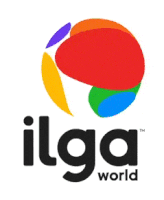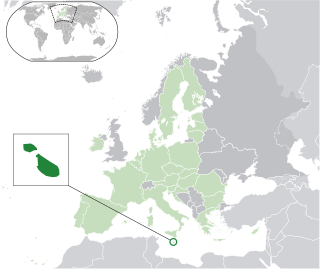
The International Lesbian, Gay, Bisexual, Trans and Intersex Association (ILGA) is an organization which is committed to advancing human rights to all people, disregarding gender identity, sex characteristics and expression. ILGA participates in a multitude of agendas within the United Nations, such as creating visibility for LGBTI issues by conducting advocacy and outreach at the Human Rights Council, working with members to help their government improve LGBTI rights, ensuring LGBTI members are not forgotten in international law, and advocating for LBTI women's issues at the Commission on the Status of Women.

ILGA-Europe is the European region of the International Lesbian, Gay, Bisexual, Trans and Intersex Association. It is an advocacy group promoting the interests of lesbian, gay, bisexual, trans and intersex (LGBTI) people, at the European level. Its membership comprises more than 500 organisations from throughout Europe and Central Asia. The association enjoys consultative status at the United Nations Economic and Social Council and participatory status at the Council of Europe.

The Organisation Intersex International (OII) is a global advocacy and support group for people with intersex traits. According to Milton Diamond, it is the world's largest organization of intersex persons. A decentralised network, OII was founded in 2003 by Curtis Hinkle. Upon Hinkle's retirement, American intersex activist Hida Viloria served as Chairperson/President elect from April 2011 through November 2017, when they resigned in order to focus on OII's American affiliate, OII-USA's transition into the independent American non-profit, the Intersex Campaign for Equality.

In law, sex characteristic refers to an attribute defined for the purposes of protecting individuals from discrimination due to their sexual features. The attribute of sex characteristics was first defined in national law in Malta in 2015. The legal term has since been adopted by United Nations, European, and Asia-Pacific institutions, and in a 2017 update to the Yogyakarta Principles on the application of international human rights law in relation to sexual orientation, gender identity, gender expression and sex characteristics.

Intersex people are individuals born with any of several sex characteristics including chromosome patterns, gonads, or genitals that, according to the Office of the United Nations High Commissioner for Human Rights, "do not fit typical binary notions of male or female bodies".
The Intersex Campaign for Equality (IC4E) is a non-governmental organization that advocates for the human rights of intersex people. It was formerly the US affiliate of Organisation Intersex International.

Intersex Human Rights Australia (IHRA) is a voluntary organisation for intersex people that promotes the human rights and bodily autonomy of intersex people in Australia, and provides education and information services. Established in 2009 and incorporated as a charitable company in 2010, it was formerly known as Organisation Intersex International Australia, or OII Australia. It is recognised as a Public Benevolent Institution.

Intersex civil society organizations have existed since at least the mid-1980s. They include peer support groups and advocacy organizations active on health and medical issues, human rights, legal recognition, and peer and family support. Some groups, including the earliest, were open to people with specific intersex traits, while others are open to people with many different kinds of intersex traits.

The International Intersex Forum is an annual event organised, then later supported, by the ILGA and ILGA-Europe that and organisations from multiple regions of the world, and it is believed to be the first and only such intersex event.
Intersex Aotearoa is a nonprofit organisation based in New Zealand, and is a national advocacy and peer support organisation for intersex people. The organisation was founded in 1996 by Mani Mitchell, and has previously been known as the Intersex Trust Aotearoa New Zealand and Intersex Awareness New Zealand.

Dan Christian Ghattas is an intersex activist, university lecturer and author who co-founded OII Europe in 2012 and is now executive director. In 2013, he authored Human Rights between the Sexes, a first comparative international analysis of the human rights situation of intersex people.

Intersex people are born with sex characteristics, such as chromosomes, gonads, or genitals, that, according to the UN Office of the High Commissioner for Human Rights, "do not fit typical binary notions of male or female bodies."

Intersex people are born with sex characteristics, such as chromosomes, gonads, or genitals that, according to the United Nations Office of the High Commissioner for Human Rights, "do not fit typical binary notions of male or female bodies".

Intersex people are born with sex characteristics, such as chromosomes, gonads, or genitals that, according to the UN Office of the High Commissioner for Human Rights, "do not fit typical binary notions of male or female bodies". "Because their bodies are seen as different, intersex children and adults are often stigmatized and subjected to multiple human rights violations".

Intersex people are born with sex characteristics that "do not fit the typical definitions for male or female bodies". They are substantially more likely to identify as lesbian, gay, bisexual, or transgender (LGBT) than the non-intersex population, with an estimated 52% identifying as non-heterosexual and 8.5% to 20% experiencing gender dysphoria. Although many intersex people are heterosexual and cisgender, this overlap and "shared experiences of harm arising from dominant societal sex and gender norms" has led to intersex people often being included under the LGBT umbrella, with the acronym sometimes expanded to LGBTI. Some intersex activists and organisations have criticised this inclusion as distracting from intersex-specific issues such as involuntary medical interventions.

The following is a timeline of intersex history.

Intersex rights in Australia are protections and rights afforded to intersex people through statutes, regulations, and international human rights treaties, including through the Sex Discrimination Act 1984 (Cth) which makes it unlawful to discriminate against a person based upon that person's intersex status in contexts such as work, education, provision of services, and accommodation.

Intersex rights in Malta since 2015 are among the most progressive in the world. Intersex children in Malta have world-first protections from non-consensual cosmetic medical interventions, following the passing into law of the Gender Identity, Gender Expression and Sex Characteristics Act in 2015. All Maltese intersex persons have protection from discrimination. Individuals who seek it can access simple administrative methods of changing sex assignment, with binary and non-binary forms of identification available.

Intersex people in Germany have legal recognition of their rights to physical integrity and bodily autonomy, with exceptions, but no specific protections from discrimination on the basis of sex characteristics. In response to an inquiry by the German Ethics Council in 2012, the government passed legislation in 2013 designed to classify some intersex infants to a de facto third category. The legislation has been criticized by civil society and human rights organizations as misguided.

Intersex people are born with sex characteristics, such as chromosomes, gonads, hormones, or genitals that, according to the UN Office of the High Commissioner for Human Rights, "do not fit the typical definitions for male or female bodies". Such variations may involve genital ambiguity, and combinations of chromosomal genotype and sexual phenotype other than XY-male and XX-female.










